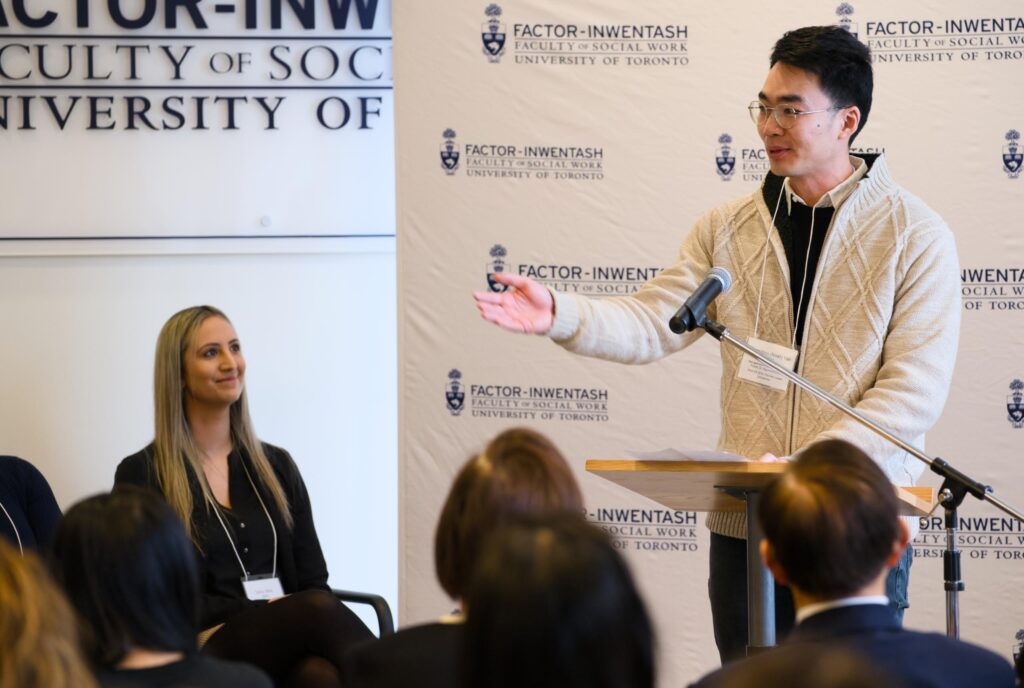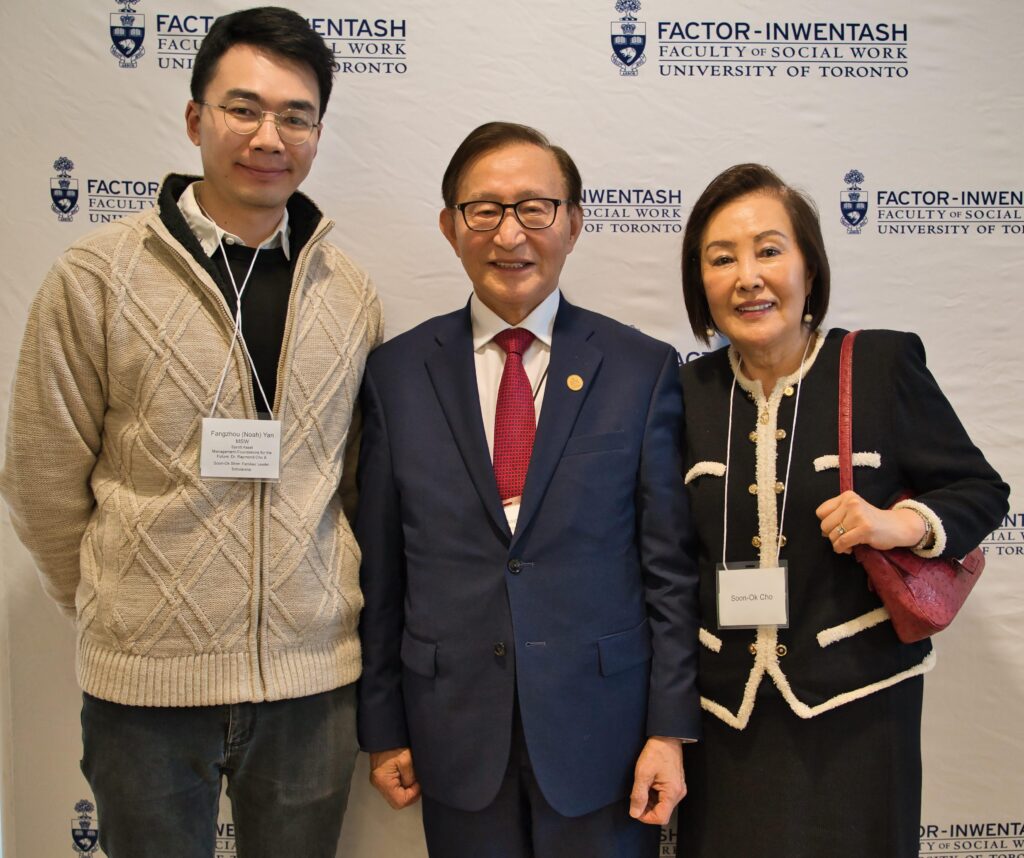From the classroom to counselling
Categories: Programs + Teaching, StudentsA former teacher in China, Spring 2025 social work graduate Noah Yan now hopes to tackle taboos around mental health — and improve outcomes for children through couples and family therapy

Noah Yan speaking at FIFSW’s Community Appreciation Event held in March 2025
As a teacher at an elite high school in his home country of China, Noah Yan noticed that many of his students were struggling with mental health issues and other personal concerns, despite excelling academically. He became a confidante and resource, but wanted to do more to support their wellbeing. Now, with a Master of Social Work degree from the University of Toronto, he’s equipped to do just that.
“Ideally, I’d like to play a role in getting whole communities — families, schools, social workers and youth themselves — engaged with young people’s development,” says Yan, who left an eight-year career in education to attend the Factor-Inwentash Faculty of Social Work.
As a start, the new graduate has accepted a job as the associate director of counselling at a camp for children and youth with learning disabilities and mental health issues run by the Child Development Institute. “I’m really looking forward to this work because it’s a perfect combination of my background in teaching and my social work knowledge and skills,” says Yan, who chose to specialize in the Children and their Families field of study for his MSW.
Looking ahead, he hopes to find social work roles where he can help fellow Chinese immigrants navigate the Canadian education and social welfare systems to ensure their children get the support they need. “In China, mental health is still a little bit taboo and there’s a lot of stigma around it,” says Yan. “I think it will build trust with parents to know that I share their cultural background. For example, they might be more willing to give therapy a try.”
Whatever direction his career goes, Yan is committed to providing couples and family therapy as a means to improving outcomes for children. While he intends for Chinese immigrants to be among his clients, Yan doesn’t plan to limit his social work practice to this group. Rather, he sees a role for himself with many different communities who might be resistant to mental health services. “Canada is so diverse – it’s why I like this country,” he says. “I want to work with as many teenagers and families as possible in my career.”
Yan himself knew very little about the social work profession when he was growing up in China.
“Social work is a new concept and a new profession to a lot of Chinese people, but as an English teacher I read a lot of English-language media and learned about it that way,” he says. “I thought that, as a social worker, I could really help young people, so I decided to apply.”
Shifting careers in his thirties was a big leap, he says, but the decision to go to U of T was an easy one. “The faculty is very prestigious – the number two social work school in the world – and I liked that the program wasn’t only about theories. There’s a very strong relationship with the field.”
So, when Yan found himself wearing scrubs and performing social work roles at a busy Toronto hospital just months after arriving in Canada, it was exactly what he’d signed up for. “My first practicum was at Toronto General Hospital, and it was a highlight of my journey,” he says.
Working as a U of T Student Ambassador assisting other international students who were considering applying to the faculty was another memorable experience. Yan says the student ambassador program eased his transition and he wanted to do the same for others.
“I remember a long conversation with one international student who was deciding between our faculty and Cambridge University in the UK,” he says. “I shared my experience and told her all the things I value about the program.” In the end, she chose U of T.
Prospective international students are often compelled by his story: a mature student, the first in his family to receive a university degree, changing professions in a new country. “Some of them told me I was an inspiration to them, that if I could do this they could too,” he says.
Based on this feedback, Yan started posting online about the MSW program, social work practice and life as an international student in Toronto. “I started doing videos on the Chinese version of YouTube,” he says, aiming to extend his reach to potential international students curious about the profession.
In recognition of his efforts to pave the way for international social work students like him, along with his dedication to advocating for adolescents and families, Yan received the Sprott Asset Management Foundations for the Future Award and the Dr. Raymond Cho & Soon-Ok Shim Families’ Leader Scholarship. “I appreciate this recognition and assistance because it tells me that, as long as you want to make a difference, it doesn’t matter what your background is, or how old you are,” he says. “I’m grateful to the faculty and these donors for believing in me and my commitment to shaping a better future for youth.”
By Megan Easton

Noah Yan, left, with Dr. Raymond Cho (MSW 1971) and Soon-Ok Shim
About the Dr. Raymond Cho & Soon-Ok Shim Families’ Leader Scholarship
Established by the Dr. Raymond Cho and Soon-Ok Shim Families, the Dr. Raymond Cho & Soon-Ok Shim Families’ Leader Scholarship, honours the late Professor Margaret Kirkpatrick, who was an Assistant Professor and then Associate Professor at the University of Toronto’s Faculty of Social Work from 1956 through to 1978. Professor Kirkpatrick had an indelible impact on her students and on Dr. Raymond Cho, who credits her for inspiring him to pursue social work and attend FIFSW which in part contributed to his many later successes. The scholarship is awarded annually to four MSW or PhD students registered at FIFSW, and is open to all FIFSW students with preference given to students registered with Accessibility Services when possible. Additional consideration is given to students who have demonstrated overcoming accessibility barriers, including through a care-taker role.
The Factor-Inwentash Faculty of Social Work is deeply grateful to the Dr. Raymond Cho and Soon-Ok Shim Families for supporting the establishment of this award. Scholarships like these at FIFSW are funded by Annual and Leadership donors, and Major Gift donors, whose support has an incredible impact on students. To learn more about supporting students at the Factor-Inwentash Faculty of Social Work, please contact Development Officer Jijo Quayson at jijo.quayson@utoronto.ca or 416-946-8339.
Related:
- Global healing rooted in Indigenous values
- Recognizing the invaluable work of our field instructors
- 6 reasons to pursue a Master of Social Work degree at the University of Toronto
- Meet spring 2024 graduate and Student Leadership Award winner Vithusan Arunakirinathan
- ‘This scholarship made me feel like I’m here for a reason’: New social work graduate award invests in Black and Indigenous students